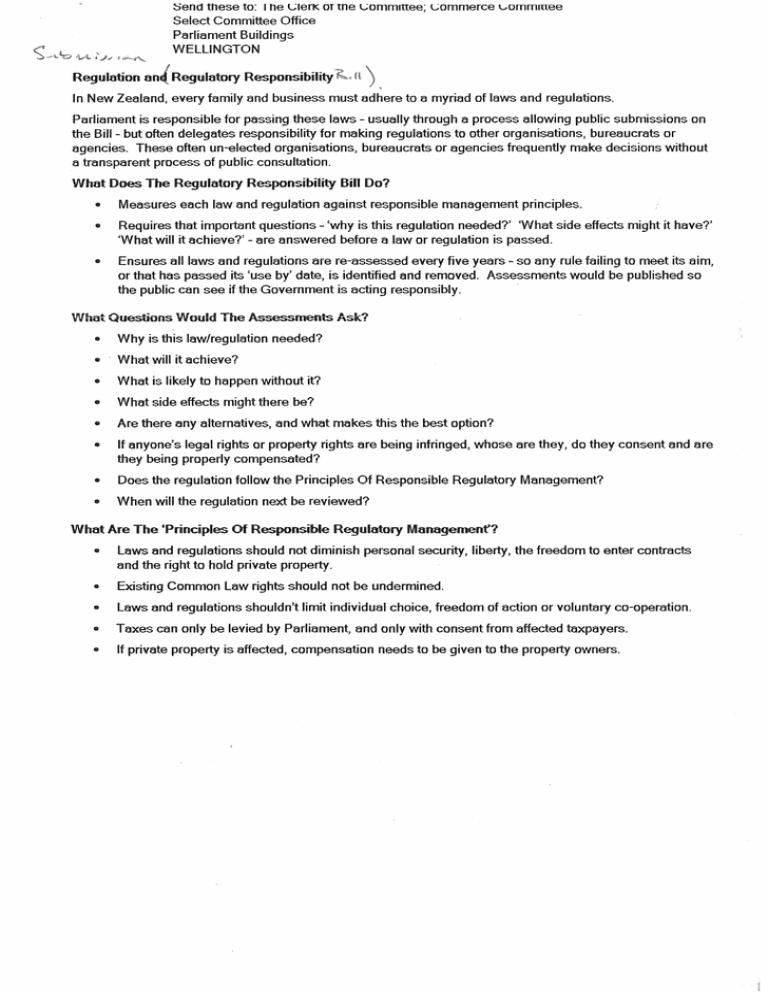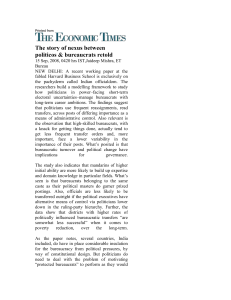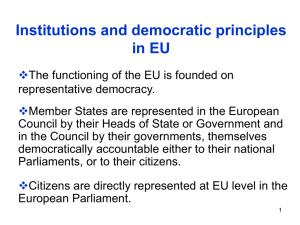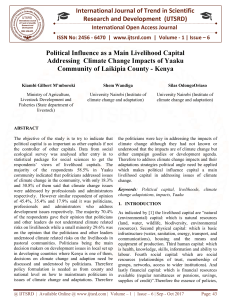Regulatory Responsibility z. ct The Regulatory Respnsibiliity Biili Do
advertisement

Send these to: I he Ulerrc.or rne Lommrltee; Lommerce Lomminee Select Committee ORice Parliament Buildings WELLINGTON Regulatory Responsibility z. ct In New Zealand, every family and business must adhere to a myriad of laws and regulations. Parliament is responsible for passing these laws - usually through a process allowing public submissions on the Bill - but often delegates responsibility for making regulations to other organisations, bureaucrats or agencies. These often un-elected organisations, bureaucrats or agencies frequently make decisions without a transparent process of public consultation. The Regulatory Respnsibiliity Biili Do? = Measures each law and regulation against responsible management principles. = Requires that important questions - 'why is this regulation needed?' 'What side effects might it have?' What will it achieve?' - are answered before a law or regulation is passed. = Ensures all laws and regulations are re-assessed every five years - so any rule failing to meet its aim, or that has passed its 'use by' date, is identified and removed. Assessments would be published so the public can see if the Government is acting responsibly. VJhaP Qu~3r%Gans Would The As = n k Ask? Why is this lawlregulation needed? What will it achieve? What is likely to happen without it? = What side effects might there be? Are there any alternatives, and what makes this the best option? If anyone's legal rights or property rights are being infinged, whose are they, do they consent and are they being properly compensated? = Does the regulation follow the Principles Of Responsible Regulatory Management? = When will the regulation next be reviewed? What Are The "PfincipiesOf Respclnsible Regulatory Manage Laws and regulations should not diminish personal security, liberty, the freedom to enter contracts and the right to hold private property. Existing Common Law rights should not be undermined. Laws and regulations shouldn't limit individual choice, freedom of action or voluntary co-operation. Taxes can only be levied by Parliament, and only with consent from affected taxpayers. = If private propeq is affected, compensation needs to be given to the property owners. Laws and regulations should not be retrospective, overly complex or discriminatory. What If A Regulation Dwsn't Meet The Pnrrciples? While we can't limit what future Parliaments do, we can ensure they explain why decisions are made so Kiwis can make up their minds about whether the right actions are taken. Although Parliaments can pass laws/ regulations that don't adhere to responsible regulatory management principles, the Economic Development Minister wilt have to publish an explanation of why it was passed. H m Will The Bill Cut Red Tape? The Bill will not directly remove red tape. Rather, it allows new and existing rules to be measured against the principles of responsible regulatory management - making it easy for ineffective rules, and those with high compliance costs, to be identified. Ensuring the public knows what rules have failed the test would put pressure on politicians to clean up bad laws and regulations from the past, and encourage them to pass ones in future. Aren't Tlh n b Just A Compliance Cost For Poli~cians? Under the l-luman Rights Act 1993, each new law must pass a test to ensure it complies with accepted human rights rules. Regulatory Responsibility assessments are similar statements that provide valuable information about the real impact of proposed laws and regulations. As regulations can become redundant or lose effectiveness over time, it's important for rules to be re-tested. There is now little incentive for politicians and bureaucrats to change out-dated rules -this is why the public must know and see the problems these rules create. These re-assessments of rules are designed to make it clear when old rules are no longer helpful, thus providing the incentive to clean them up - if it proves too complex to explain why a certain law or regulation is needed, then that rule is probably not necessary. How Will This Bill Help My Busin Complying with regulations puts a huge cost burden on small businesses. The Institute of Chartered Accountanb estimates this cost - which mostly falls on small businesses - to be as high as $25 billion a year. By analysing what these rules actually achieve, and removing those which have little benefit, it will be easier far businesspeople to focus on doing business. How Will This Bill Help My Family? Regulations don't only affect businesses - every household must to abide by regulations set down by Councils and Government. There is a proliferation of silly rules to follow - from what colour we can paint our house to whether we can trim our neighbour's trees. The Regulatory Resp0nsibilit)l Bill requires all rules to be measured to see if they actually doing any good - and encourages politicians and bureaucrats to work out vd-iat effects new suies will have before they're introduced.









